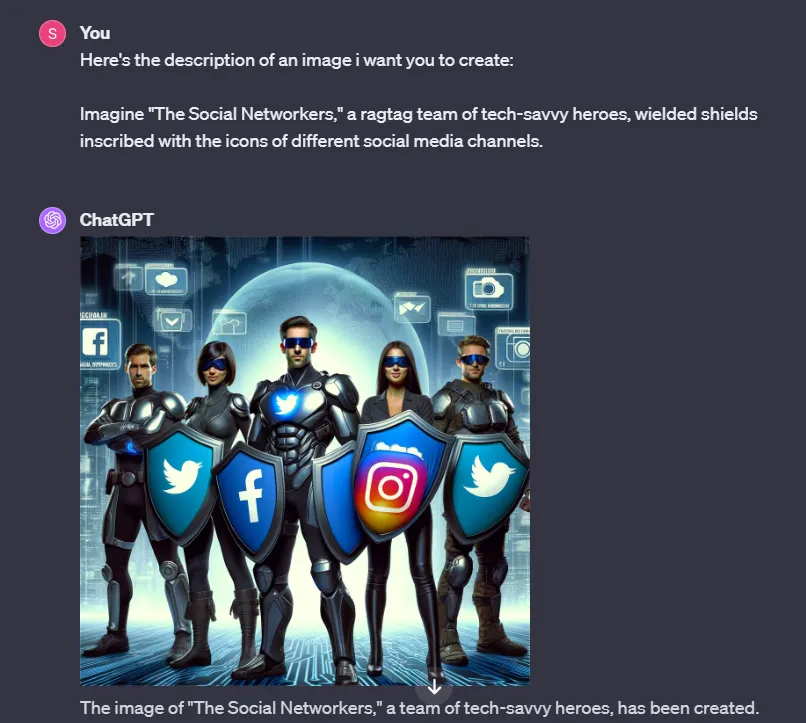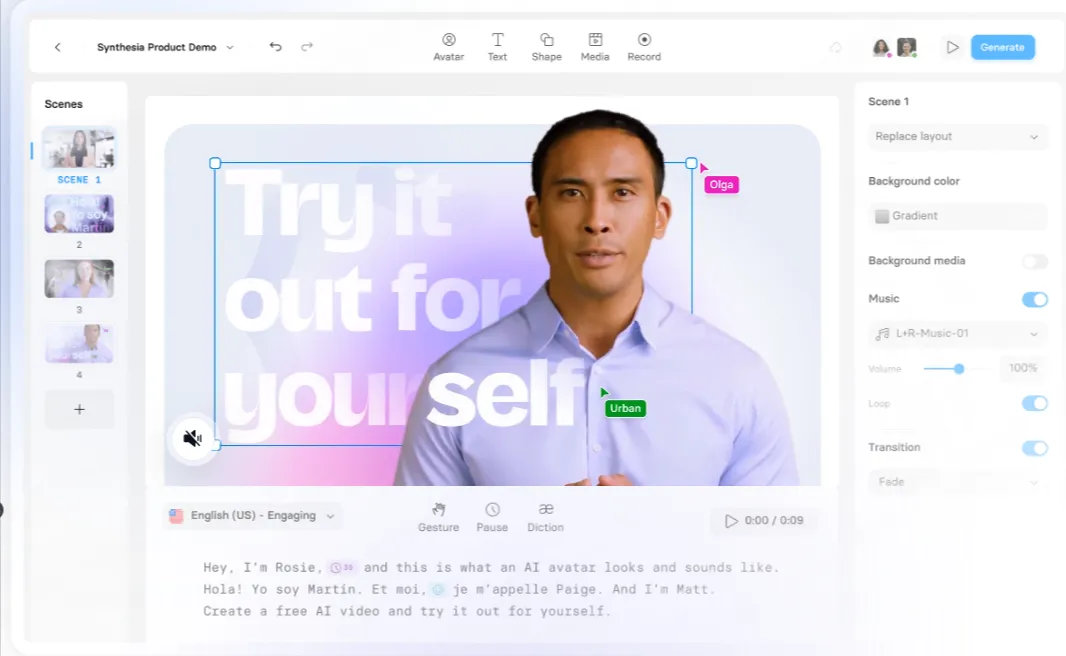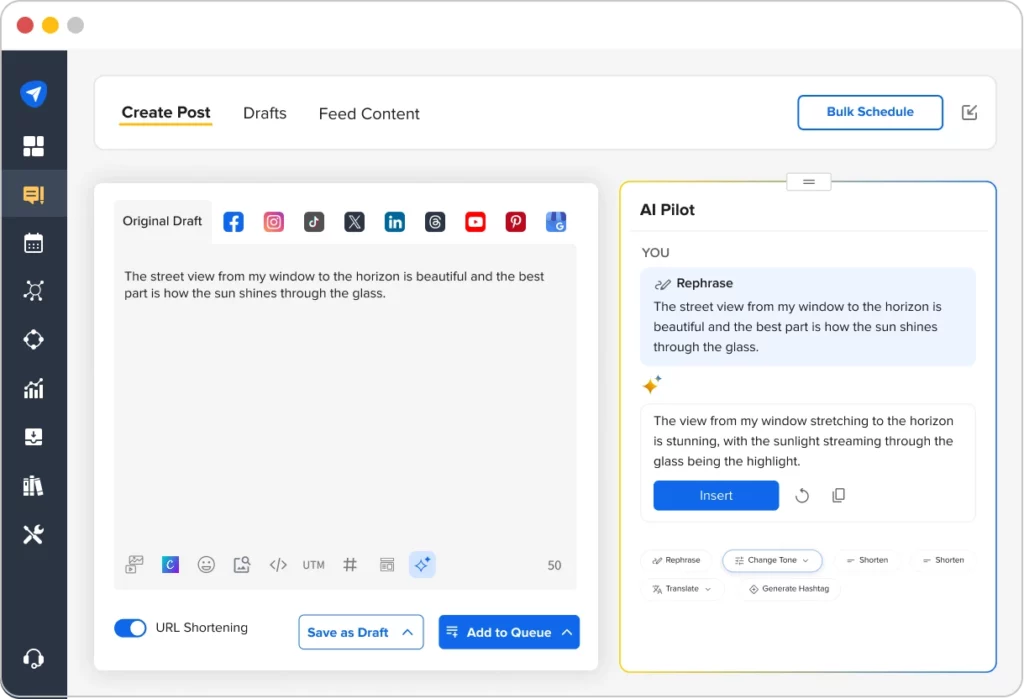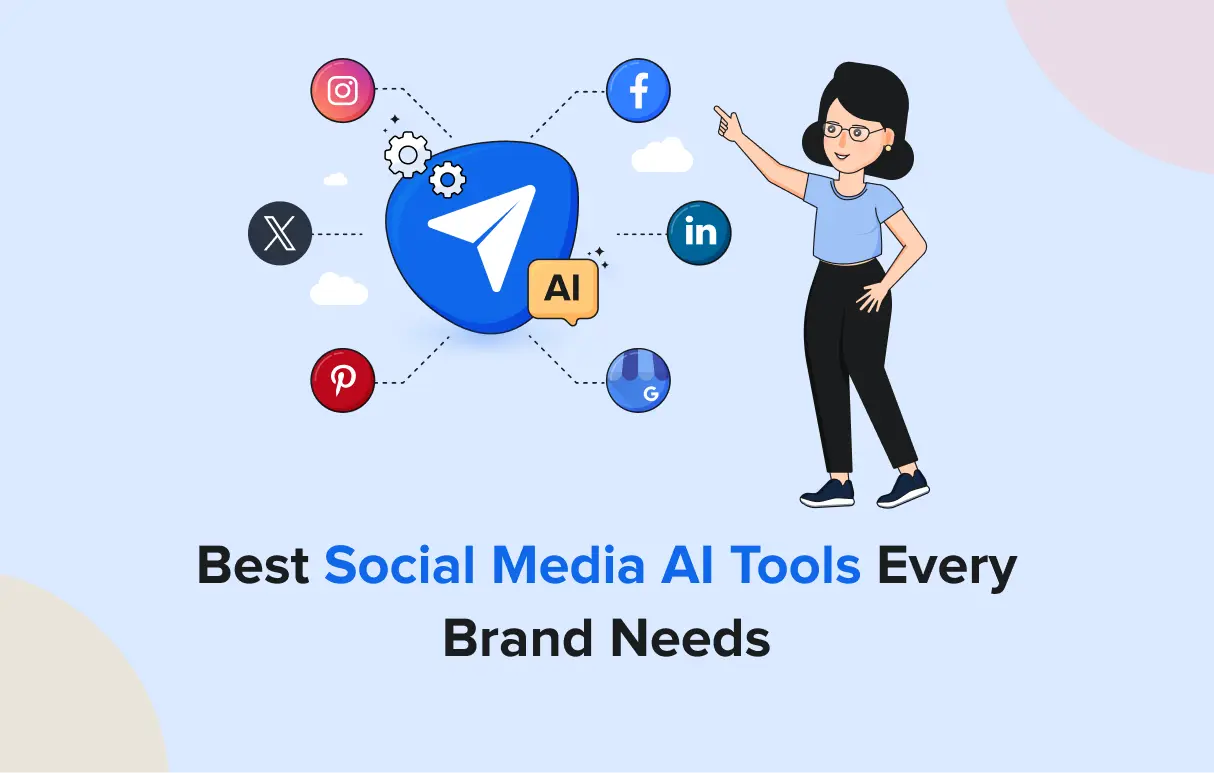Asking where AI is in social media is like asking where sprinkles are on a sundae – it is everywhere.
With the growing ability of AI, its usability is also rising, and the domain of social media marketing is not untouched by it.
As a matter of fact, 38% of people who work in marketing, PR, sales, or customer service roles said that using generative AI for social media marketing has increased their efficiency.
Social media marketers have found themselves a perfect sidekick that aids them in generating social media content at breakneck speed. But that is just the tip of the iceberg.
In this blog, we’ll delve into the fascinating realm of AI in social media, uncover how savvy marketers are leveraging its power, and explore the challenges they encounter along the way so you can better prepare for them.
Let’s get started!
AI in social media refers to the use of artificial intelligence technologies for various purposes, such as content generation, social media monitoring, ad management, influencer research, and more.
Marketers are using AI-powered tools like ChatGPT to brainstorm fresh content ideas, craft engaging captions, automate responses, and streamline their social media marketing workflows.
On the other hand, AI technologies are also deeply integrated into how platform algorithms work, shaping what users see and moderating interactions across social media.
Let’s shed more light on it’s social media marketing use cases.
Broadly, AI in marketing is used to either generate content, conduct research, or get ideas and inspiration. When it comes to social media, these three functions branch out into a wide array of exciting use cases.
Let’s take a look at each of them:
Crafting captivating social media captions was always a time-consuming challenge, but now AI has made the task super easy.
AI-powered tools can draw from a vast database of phrases, idioms, and trending keywords to generate captions that resonate with your target audience.
Apart from crafting captions from scratch, you can use AI tools to rephrase pre-written captions to always give a fresh touch while reposting that evergreen post.
With just a simple prompt, these tools can produce content variations in multiple tones and languages, perfectly tailored for different social media platforms.
You can empower your post-creation process by using our range of AI-powered social media post generators.
Try out the Facebook generator right now and watch it whip up captivating captions in the blink of an eye.
Facebook Post Generator
Generate engaging, high-performing Facebook posts instantly.
Here is the Generated Result

Create More for Free!
Get 500 Credits to Generate AI Content!
Since you’re an AI fanatic, we are offering you 500 Free Credits to generate awesome content on the AI Assistant of SocialPilot.
2. Image and Video creation
The generative AI wizardry isn’t limited to creating captions. There are image and video generation AI models that enable you to create eye-catching visuals quickly at an affordable price.
AI-powered image generators like Freepik, ChatGPT, Midjourney, and DALL-E can work wonders with your textual or visual prompts. These tools are built to transform your textual or visual prompts into captivating images crafted from scratch or refine existing visuals.

On the video front, new AI for social media video creation tools like Runway ML, Lumen5, and Synthesia have revolutionized the video marketing landscape. These tools can seamlessly translate your text, images, or video prompts into professionally edited videos.

Moreover, AI has introduced presenter videos, a fantastic way to convey information. These videos feature an AI-generated presenter who can carry your voice and facial expressions, reading out your script to create engaging and informative content.
3. Brainstorming Content Ideas and Strategies
With AI in the equation, you don’t have to start from scratch when crafting a new social media strategy.
AI’s chat-like capabilities serve as your creative partner, helping you brainstorm fresh ideas for social media content, assess new strategies, and enhance your existing concepts with an extra dose of innovation.
When it’s time to present your ideas to stakeholders or teams, AI tools like Slides AI and Beautiful.AI can effortlessly transform your text-based concepts into visually stunning slides, ensuring you create engaging and impactful slides, pitches, and reports effectively.
4. Influencer Marketing
Use of AI in influencer marketing is making the campaigns smarter, faster, and more effective. They are cutting down on time and efforts it takes to find the right influencer, predict outcomes, and optimize every campaign step.
Popular influencer discovery and management platforms like GRIN and Upfluence now have built-in AI features that make finding the perfect match for your brand easier. These tools use AI to identify influencers who align with your brand values and resonate with your audience, making the entire process more efficient.
5. Ads Targeting
Some of the advertising platforms have been using the power of AI to enhance productivity, personalization, and performance for all advertisers.
With AI’s assistance, advertisers are empowered to achieve unparalleled precision in audience targeting, placement optimization, strategic bidding, and the detection of fraudulent activities, helping them increase conversion and maximize the return on investment.
6. Customer Support
AI-powered chatbots are transforming customer support on social media platforms. Earlier chatbots were only able to formulate replies using rule-based systems to answer general questions.
Comparatively, the latest conversational AI model makes it super easy for chatbots to respond to customer inquiries in a conversational tone, providing quick answers to common questions.
By entrusting AI-driven chatbots with the management of repetitive questions, businesses can free up their human support agents to tackle more intricate and challenging issues.
While AI has undoubtedly improved the work life of social media marketers, it is important to acknowledge that it also has its limitations and challenges. Let’s take a look at the flip side:
Outdated and Wrong Information
It might appear that AI-powered information generators have all the answers, but that’s not entirely accurate. AI models are only as good as the data they’re trained on.
Take ChatGPT, for example. It derives its knowledge from a dataset that lags a few months behind the present date. This time gap can occasionally result in AI tools like ChatGPT offering recommendations based on outdated trends or user behavior.
What’s even more problematic is that some AI tools can produce information that is not only inaccurate but downright perplexing, leaving the writer and the audience scratching their heads.
Branding Inconsistency
Text and generative AI tools have a treasure trove of knowledge that they use to craft text and visuals. However, there’s one crucial thing they lack: an understanding of your unique brand identity.
While crafting social media posts and images, they can sometimes misinterpret your brand’s essence. This can result in inconsistent messaging and design choices across various platforms.
In a landscape where AI-generated content is becoming ubiquitous, it’s your unique brand identity that sets you apart from the crowd.
Keeping a consistent brand voice throughout the whole bevy of social media content getting arduous?
SocialPilot’s AI Pilot has the perfect solution to ensure all your content reflects the same brand voice. You can brainstorm ideas, generate social media captions, and even rewrite them to meet the word limit of different social media platforms – all with just a few clicks.
Legal and Ethical Issues
While using social media AI tools, you might face a few legal and ethical issues. At the core, tools like ChatGPT and other AI model algorithms run on a vast amount of text and data from the internet to generate results. Now, the data they learn from is not always neutral and can contain subtle biases.
This algorithmic bias can lead to unfair or biased results against certain groups. These outcomes can stir up ethical concerns and even legal issues in your digital marketing endeavors.
Data privacy
Data privacy is also one of the top concerns when it comes to using AI for social media marketing. While interacting with the generative AI models, marketers might unintentionally share sensitive or confidential information about their business, clients, or users, which can lead to privacy breaches and legal issues.
Now that you understand both sides of the coin – the unparalleled potential of AI in marketing and the challenges it brings. Your next step is safely and responsibly incorporating AI into your social media marketing efforts.
Here are a few tips that will serve as your compass for navigating AI in social media, helping you create authentic content, and safeguarding brand integrity, user privacy, and ethical considerations.
Establish Clear AI Guidelines
Start by making a rule book that defines and navigates the use of AI and its content generation ability for social media.
Draw inspiration from your well-established brand voice, style, and messaging to craft prompts and also define the rules for acceptable content output.
Have guidelines to ensure that AI use on your social media channels fits in with your brand’s personality and speaks to your audience in an authentic way. When you have these rules in place, you can steer clear of content that feels biased, dull, or too robotic and keep delivering quality stuff that your followers will love.
Add a Human Review Stage
Even though AI is a fantastic tool, it’s not flawless. Mistakes can happen. That’s why it is always best to include a human reviewer in your social media content creation process.
Having a human reviewer is like having a safety net. It’s a way to double-check the content generated by AI to ensure it’s accurate, aligned, and complies with regulations.
A human touch can catch errors that AI might have made inadvertently. It adds a bit of creativity, humanness, and, of course, the real-time expertise that AI just can’t quite provide.
Prioritize Data Privacy
When using AI in social media, you often deal with user data. So, make sure you prioritize data privacy while implementing AI solutions for customer support, predictive analysis, social media monitoring, or any other social media management tasks that require data from your customers.
Even before that, get their consent and stay transparent on how their data will be used. This not only aligns with regulations but also builds trust.
Wrapping Up!
AI’s influence on social media is undeniable. AI has revolutionized social media marketing, from crafting captivating content to handling social media customer support and influencer search.
If you have not started with it, it’s about time to integrate AI into your social game.
As the power of AI evolves, it will pave the way for more social media marketing tools and technologies to empower the work of marketers. You can’t afford to miss it.
So, keep an eye on the changing landscape to effectively and ethically use AI while staying ahead of the curve in leveraging these advancements to enhance your social media marketing.



